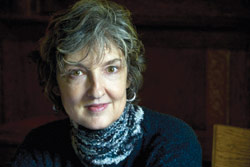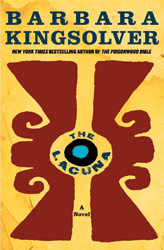When award-winning author Barbara Kingsolver was searching for the perfect place to set the American scenes of her new novel, The Lacuna (Harper, 2009), she considered D.C. and Virginia. Then, "It hit me that Asheville was perfect," she tells Xpress.

Because of its long history as a tourist town, Asheville has been well-photographed: A boon to an historical researcher. Lacuna's main character, Harrison Shepherd, reaches the mountain city in 1941. When Kingsolver (who lives just two hours away) came to Asheville to study the town, she found that "I could go to Malaprop's and buy books of old post cards. I could walk around downtown and half of what I looked at was there in 1941. Likewise there are neighborhoods I could walk around, like the Montford district, that look pretty much as they did in the 1940s except for the cars parked out front."
Shepherd becomes a novelist: "People think that. If a person is famous, he must have wanted to be in the public eye. But to me, writing books is a way to earn a living in my pajamas," the reclusive character says of his career choice. He lives in Montford near the Highland Hospital ("Zelda [Fitzgerald] and I have been neighbors for years," he writes to a friend). His stenographer is an Appalachian widow called Violet Brown who — despite antiquated turns of phrase like "fairly warned is fair afeared" — proves herself to be far more adventurous and free-thinking than her contemporaries.
But this is only part of the story. "I begin with the theme," says Kingsolver, whose previous works include bestsellers The Poisonwood Bible and Animal, Vegetable, Miracle. "I figure out what I want the book to mean and then I build a story that will carry my theme." The most prominent theme in Lacuna is McCarthyism (the witch-hunt for communist sympathizers among American citizens during the '50s).
"I was very interested in the events in the middle of the last century that I thought gave rise to the modern American political identity," the author explains. (Kingsolver is no stranger to socio-political issues in her writing, and has received both the National Humanities Medal and the Physicians for Social Responsibility National Award.) "A lot of the things we think of ourselves now, as a nation, and a lot of the ways we distinctively behave, in terms of our national mood, have intrigued me for a long time. Why are we so uneasy with any combination of art and politics? Why are we so uneasy, for that matter, with self-criticism in general? Why is that we like to see our country as a perfect finished product, rather than a working model that's always in progress?"
Kingsolver believes that the years following World War II left Americans with "a legacy of dread." "When I started looking into it, I thought, 'How useful to contrast that with a country very nearby that ended up with a very different political identity,'" she says. "In Mexico, self-criticism is a national pastime. The Mexican revolution is ongoing. It gets revised every year."
So, she did just that. Duel citizen Shepherd spent his youth South of the border with his Mexican mother. It's Shepherd's mother who tells him in Lacuna's opening pages, "You had better write all this in your notebook … So when nothing is left of us but bones, someone will know where we went."

This haunting bit of advice leads Shepherd, circuitously, to the writer's life: He becomes the typist for the Mexican artist Diego Rivera and finds himself living in the household of Rivera, painter Frida Kahlo and the couple's myriad guests, including communist revolutionary Leon Trotsky.
Rife with color and suspense, Lacuna weighs in at more than 500 pages and took Kingsolver seven years to complete. But the intricate plot is never overwhelmed by the tedium of fact. In fact, the lives of real historical characters weave seamlessly with their fictional counterparts. And it's not just impeccable research that accomplishes this task; it's Kingsolver's delightful humor:
"Stalin uses hair cream?" Shepherd asks at one point.
"'Careful, lad,' said Lev. 'That knowledge alone could get you the firing squad.'"
Kingsolver spent time in the Mexican houses (now museums) inhabited by Kahlo, Rivera and Trotsky. "I did not take any liberties with their lives. I tried to be as faithful as I possibly could," she says. "A lot of the story is about how we make things up about celebrities; I didn't want to become a howler myself."
The Mexican artists create a connection between half-American Shepherd, who shows little interest in politics, and the communist movement (read between the lines for comparisons to the recent American fear of Islamic practitioners) and revolutionary thinkers. Perhaps more important, though, is Shepherd's decades-spanning relationship — through letters and news clippings (some real, culled from sources like New York Times, others fabricated in the style of the era) — with Kahlo.
"Mrs. Kahlo did that for him," Violet Brown says of Shepherd. "He'd about given up on life as a whole, going away on a train to the next world. If he didn't take one other thing, she wanted him to carry his words."
Riveting to the last page, Lacuna carries readers into new worlds while (at least for local residents) allowing us to look homeward.
Alli Marshall can be reached at amarshall@mountainx.com.
who: Barbara Kingsolver
what: New York Times bestselling author launches her latest novel, The Lacuna
where: Asheville High School Auditorium (419 McDowell St.)
when: Monday, Nov. 2 (7 p.m. Ticketed; one ticket is complimentary with each pre-purchase of The Lacuna from Malaprop's. Info: 254-6734)



Before you comment
The comments section is here to provide a platform for civil dialogue on the issues we face together as a local community. Xpress is committed to offering this platform for all voices, but when the tone of the discussion gets nasty or strays off topic, we believe many people choose not to participate. Xpress editors are determined to moderate comments to ensure a constructive interchange is maintained. All comments judged not to be in keeping with the spirit of civil discourse will be removed and repeat violators will be banned. See here for our terms of service. Thank you for being part of this effort to promote respectful discussion.